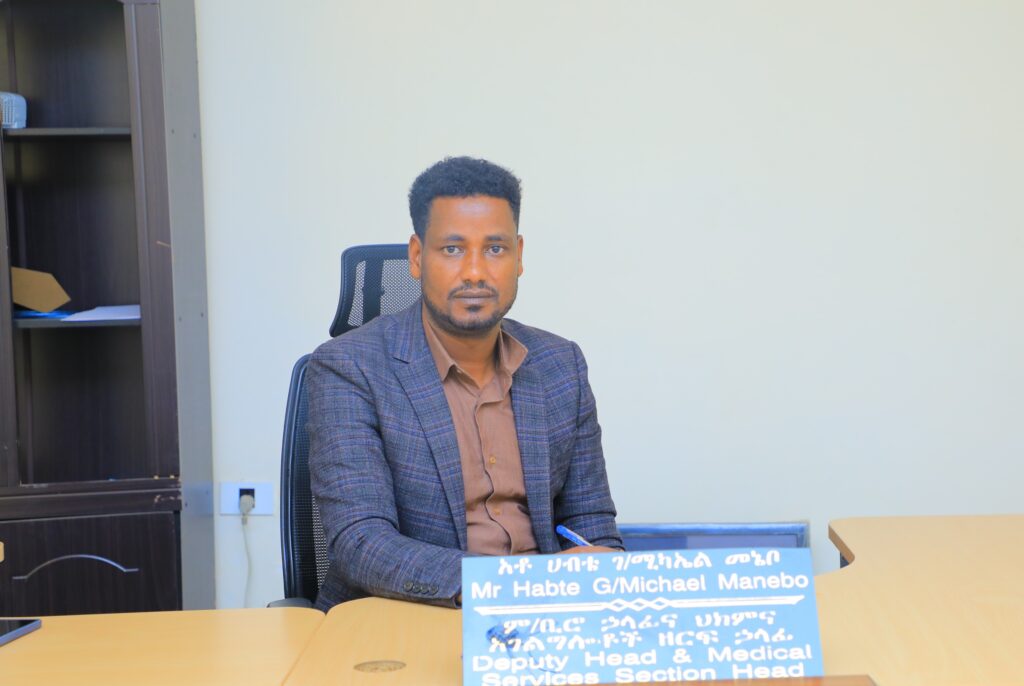Medical Service Section

The Medical Services Section of the Central Ethiopia Regional Health Bureau is dedicated to ensuring the availability, accessibility, and quality of medical services across the region. It plays a pivotal role in strengthening healthcare facilities, enhancing service delivery, and improving patient care outcomes through evidence-based interventions.
At the core of its mission is the optimization of clinical and diagnostic services, ensuring that healthcare facilities provide accurate and timely diagnoses, leading to effective treatment and improved health outcomes. In parallel, the section is committed to strengthening hospital and health facility management, enhancing operational efficiency, resource utilization, and overall service delivery.
Ensuring the availability and proper use of essential medicines and medical supplies is a key priority, helping to maintain uninterrupted healthcare services and improve patient safety. The section also focuses on expanding and strengthening referral and emergency medical services, establishing well-coordinated systems that enable timely and efficient patient transfers, especially for critical and specialized care. Read More
Recognizing the importance of a well-trained healthcare workforce, the section actively works to enhance capacity building and workforce development by providing continuous professional education, training programs, and skill enhancement opportunities for healthcare professionals. To further improve service quality, it implements quality assurance and patient safety programs, ensuring compliance with healthcare standards and protocols.
Additionally, to address the region’s growing healthcare needs, the section is committed to expanding specialized and tertiary care services, increasing access to advanced medical treatments and highly specialized interventions. Through these strategic initiatives, the Medical Services Section of CERHB aims to build a resilient and high-performing healthcare system, ultimately improving health outcomes for the population.
Objectives of the Medical Service Section
🏥 Enhance the Quality of Clinical and Diagnostic Services
- Improve the availability of essential and specialized healthcare services at all levels of the health system.
- Strengthen laboratory, imaging, and diagnostic services to ensure timely and accurate patient diagnosis.
- Promote adherence to national and international clinical treatment guidelines.
🏥 Strengthen Hospital and Health Facility Management
- Support the establishment and implementation of hospital governance frameworks.
- Enhance hospital management systems to improve efficiency, service delivery, and patient satisfaction.
- Ensure the implementation of electronic medical records (EMR) and other digital health solutions.
💊 Ensure the Availability and Proper Use of Medicines and Medical Supplies
- Improve the supply chain management of pharmaceuticals, medical equipment, and consumables.
- Strengthen rational drug use and antimicrobial resistance (AMR) containment programs.
- Monitor and regulate pharmaceutical services to ensure quality and safety.
🚑 Expand and Strengthen Referral and Emergency Medical Services
- Develop and implement effective referral systems to ensure timely access to specialized care.
- Strengthen ambulance and emergency medical response services at primary, secondary, and tertiary levels.
- Improve pre-hospital and in-hospital emergency management protocols.
📚 Enhance Capacity Building and Workforce Development in Medical Services
- Train healthcare professionals on advanced medical practices, patient safety, and clinical ethics.
- Strengthen continuous professional development (CPD) programs for medical staff.
- Support specialized medical training programs to address workforce shortages in critical areas.
✅ Implement Quality Assurance and Patient Safety Programs
- Establish and monitor healthcare quality standards to ensure safe and effective patient care.
- Strengthen infection prevention and control (IPC) practices across health facilities.
- Conduct regular health facility assessments and accreditation programs.
🏥 Expand Specialized and Tertiary Care Services
- Strengthen specialized medical services such as cardiology, oncology, nephrology, and surgery.
- Enhance medical infrastructure and technology in tertiary hospitals.
- Promote research and innovation in clinical medicine to improve treatment outcomes.

